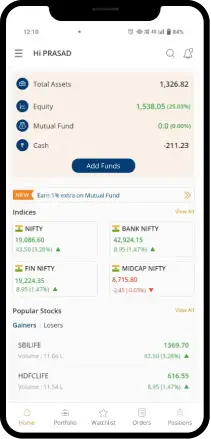Features of Debt Mutual Funds
-
 Debt funds range from extremely low risk (money market funds) to high-risk (long duration and credit risk funds).
Debt funds range from extremely low risk (money market funds) to high-risk (long duration and credit risk funds).
-
 Debt funds are more tax efficient than traditional investment options like fixed deposits and corporate FDs if held for more than 3 years.
Debt funds are more tax efficient than traditional investment options like fixed deposits and corporate FDs if held for more than 3 years.
-
 Fixed interest income makes debt funds ideal for risk-averse, conservative investors.
Fixed interest income makes debt funds ideal for risk-averse, conservative investors.
-
 Debt funds provide access to Indian capital markets which is otherwise not accessible to retail investors.
Debt funds provide access to Indian capital markets which is otherwise not accessible to retail investors.
Top 10 Performing Debt Mutual Funds




















Explore different types of debt funds
Safe-haven for savings
- Overnight debt funds: Invests in assets maturing in 1 day
- Liquid debt fund: Invests in assets maturing within 91 days
- Ultra-short duration fund: Maturity of underlying assets is 3-6 months
- Low duration fund: Maturity of underlying assets is 6-12 months
- Money market fund: Invests in highly liquid debt funds maturing in less than 1 year
- Index debt funds: Long term fund following passive investment strategy
Debt funds for higher returns
- Banking and PSU: Invest in bonds issued by banks, public institutions and municipality
- Corporate bond: Invests in AA+ and above rated corporate bonds
- Short duration: invests in bonds with 1 to 3 years of maturity
High risk - High reward debt funds
- Credit risk fund: Invests in papers rated AA+ and below
- Gilt funds: Invests in government securities with varying maturities
- Gilt with over 10-year constant duration: Invests in 10-year government security
Debt funds for long-term/ Debt funds investing in long-term bonds / Long-lasting debt funds
- Medium duration: Invests in debt instruments with 2 to 4 years of maturity
- Medium to long-term: Targets debt investments with 3 to 5 years of maturity
- Long duration: Invests in debt instruments with 5 year maturity
- Dynamic bond: Invests depending on interest rate movement.
Debt funds are financial instruments that generate returns by investing in fixed income instruments like corporate, government bonds, commercial papers, certificates of deposits, treasury bills, non-convertible debentures etc. Fund managers invest in these instruments with the intention of earning fixed interest income and principal repayment on maturity. The difference between the buying and selling price of the bonds accounts for the appreciation and depreciation of the debt fund's net asset value (NAV).
Debt funds generate returns in two ways - interest payments from debt holdings and increase in bond prices whenever interest rates fall. The capital gain/loss, also known as mark-to-market (MTM) return, depends on interest rate fluctuations. Increasing interest rates result in capital loss as bond prices fall, and interest rate increase results in capital gain as bond prices rise.
The capital gain/loss that debt funds generate also depends on the average maturity of the bond holdings. Funds with exposure to long-term bonds experience a significant increase in net asset value whenever market yield or interest rate fall. Debt funds with exposure to short-term bonds show limited capital gain/losses. Such funds make most of their money from interest payments on investing in lower-rated bonds. Bonds with lower credit ratings tend to pay more coupon income to attract investors.
Best performing debt funds find a balance by investing in bonds with varying maturity dates and credit ratings. Thus, funds exposed to long-term debt tend to generate more capital gains during falling interest rates. On the other hand, funds looking for stable coupon income would invest in debt instruments with higher credit ratings, like AAA or AA+ debt.
Who should invest in debt funds?
-

Investors with low-risk appetite and short to medium term investment horizon -

Investors with low-risk appetite and short to medium term investment horizon -

Investors with low-risk appetite and short to medium term investment horizon -

Investors with low-risk appetite and short to medium term investment horizon
Checklist to investing in debt funds
-

Expense ratio
This is the cost incurred in running a debt fund. It covers portfolio management, administration, marketing, and other costs. High expense ratio reduces your portfolio returns. So, look for funds with expense ratios below 1%. -

Maturity date
Debt funds are susceptible to interest rate fluctuations. Debt funds with exposure to long-term bonds tend to do well in a declining interest rate environment. Likewise, debt funds exposed to short-term bonds perform well in high interest-rate environment. -

Credit risk
This is a risk that arises when the borrower fails to pay interest and principal upon maturity. Credit risk debt funds offer higher coupon but are not recommended for risk-averse investors. Only highly aggressive investors should opt for credit risk funds. -

Interest rates
Interest rate influences debt fund returns. The best time to invest is when interest rates are expected to fall as bond prices tend to increase, which has a positive impact on debt funds’ net asset value (NAV).
Taxation of debt funds
| Holding period | Type of gain | Tax rate |
|---|---|---|
| Less than 36 months | Short term capital gains (STCG) | As per income tax slab |
| More than 36 months | Long term capital gains (LTCG) | 20% with indexation |
FAQs on Debt Mutual Funds
Debt funds invest in fixed income instruments, which carry a higher degree of safety compared to stocks. So, yes debt mutual funds are safer compared to equities.
While debt mutual funds are less risky than equities, they are prone to interest rates, credit, and liquidity risks.
Inflation levels in India are slowly stabilizing and oil prices have come off their peak. Thus, interest rate hikes are expected to ease off. So, this can be a good time to invest in debt mutual funds that cater to market volatility and fluctuating interest rates.
Both equity and debt funds cater to different risk profiles and investment objectives. While debt mutual funds are ideal for investors who want steady income, equity mutual funds are perfect for investors looking to get capital appreciation at medium to high risk.
One can invest in debt funds through lumpsum investment or systematic investment plans offered by brokers like m.Stock at zero commissions.
Short term capital gains from debt funds are taxed as per the investor’s income tax slab. Whereas long term capital gains are taxed at 20% after indexation on the purchase price.
Yes, dividends earned from debt funds are taxable. They are added to an investor's total income and taxed at the individual income tax slab rate.
Power your investments with our smart trading platforms





